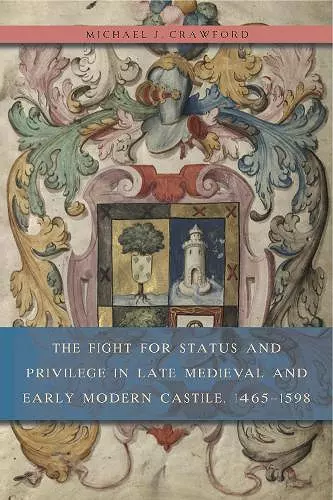The Fight for Status and Privilege in Late Medieval and Early Modern Castile, 1465–1598
Format:Hardback
Publisher:Pennsylvania State University Press
Published:27th Mar '14
Currently unavailable, and unfortunately no date known when it will be back
This hardback is available in another edition too:
- Paperback£33.95was £33.95(9780271062907)

In The Fight for Status and Privilege in Late Medieval and Early Modern Castile, 1465–1598, Michael Crawford investigates conflicts about and resistance to the status of hidalgo, conventionally understood as the lowest, most heavily populated rank in the Castilian nobility. It is generally accepted that legal privileges were based on status and class in this premodern society. Crawford presents and explains the contentious realities and limitations of such legal privileges, particularly the conventional claim of hidalgo exemption from taxation. He focuses on efforts to claim these privileges as well as opposing efforts to limit and manage them. Although historians of Spain acknowledge such conflicts, especially lawsuits associated with this status, none have focused a study on this extraordinarily widespread phenomenon. This book analyzes the inevitable contradictions inherent in negotiation for and the implementation of privilege, scrutinizing the many jurisdictions that intervened in these struggles and debates, including the crown, judiciary, city council, and financial authorities. Ultimately, this analysis imparts important insights about the nature of sixteenth-century Castilian society with wide-ranging implications about the relationship between social status and legal privileges in the early modern period as a whole.
“Based on meticulous archival research, Crawford’s book reveals the complicated and fluid reality of ‘how Castilians actually experienced legal inequality in the early modern world.’ . . . [T]his is a book that a wide variety of historians will find an invaluable support to understanding the context of their own work.”
—Grace E. Coolidge American Historical Review
“Crawford’s book is a worthy successor to the research of his mentor, Helen Nader. Much more than a simple study concerning the struggle to preserve or quash hidalguia among all sorts of Spanish families of the fifteenth and sixteenth centuries, this book points to an early modern Iberian society seeking to find a replacement for its fast-fading medieval past.”
—Donald J. Kagay Sixteenth Century Journal
“Crawford’s careful and thorough research makes an important contribution to our understanding of the fluidity and ambiguity of noble status in early modern Castile.”
—Jodi Campbell English Historical Review
“What did it mean to be an hidalgo? This was a important status in late medieval and early modern Spain, one that all historians know was crucial—but none have really known much about it until now. Michael Crawford argues that hidalguía had little to do with the two main justifications that contemporary Spaniards gave for the privilege: that it either derived from a racial understanding of inherited nobility or was a reward for service to the king. Instead, noble status was fluid, contingent on circumstance, political networking, and the ability to carry out lengthy lawsuits successfully. Using hitherto unexploited sources, Crawford’s subtle analysis displays the rich complexity of local government in early modern Spain, pulling attention away from the so-called absolutism of the central government and showing how much more important the officials, regulations, and courts of local municipalities were in the real lives of Spaniards.”
—Scott K. Taylor, University of Kentucky
“Michael Crawford’s insightful monograph, The Fight for Status and Privilege in Late Medieval and Early Modern Castile, 1465–1598, offers the most engaging and carefully researched account of the widespread social pressure to reach noble status in late medieval and early modern Spain. Vividly describing the mechanisms to accomplish such aims, he uses the process of ennoblement, and resistance to it, as a lens through which to explore Spanish society. Focusing on Seville, Crawford provides his readers with a clear and compelling portrait of the manner in which conversos, foreigners, and others (most often newcomers to Seville) litigated with municipal authorities as they sought to confirm their status as hidalgos or petty noblemen. This was not an idle aspiration, since hidalgo status led to tax exemptions and privileges. This is an excellent book that clearly portrays the almost obsessive desire to achieve noble rank in early modern Spain, as well as the municipalities’ often failed efforts to protect their tax base. This is an important and first-rate contribution to our knowledge of the social and legal aspects of this conflict and, thus, to our understanding of one of the most critical issues in the history of early modern Spain.”
—Teofilo F. Ruiz, UCLA
ISBN: 9780271062891
Dimensions: 229mm x 152mm x 20mm
Weight: 454g
256 pages